When the chill of winter sets in, space heaters become a go-to solution for many seeking warmth. However, it’s crucial to be aware of the potential risks associated with these devices, particularly the danger of carbon monoxide (CO) poisoning. At TrueTemp HVAC, we prioritize your safety and comfort, and it’s essential to understand how and when a space heater can become a hazard.
What is Carbon Monoxide and How is it Produced?
Carbon monoxide is a colorless, odorless gas that can be lethal if inhaled in enclosed spaces. It is produced by the burning of materials containing carbon, such as gasoline, natural gas, oil, kerosene, wood, or charcoal. The incomplete combustion of these materials in various heating appliances can lead to the accumulation of CO.
Can Electric Space Heaters Emit Carbon Monoxide?
Electric space heaters, which are widely used due to their convenience and efficiency, do not burn fuel internally to generate heat; therefore, they do not produce carbon monoxide. The primary risks associated with electric heaters include electrical hazards and fire risks, not CO poisoning. However, this does not mean that all space heaters are safe from producing CO.
The Risks of Fuel-Burning Space Heaters
Unlike their electric counterparts, fuel-burning space heaters can pose a significant risk of carbon monoxide poisoning if they are not used correctly. These types of heaters include those powered by propane, natural gas, kerosene, or other combustibles. When these fuels do not burn completely, carbon monoxide is produced.
How to Safely Use Fuel-Burning Space Heaters
To minimize the risks associated with fuel-burning space heaters and prevent CO poisoning, consider the following tips:
Ventilation is Crucial: Always ensure that the room or area is well-ventilated. Open windows or doors periodically to allow fresh air to circulate and displace any potentially accumulated gases.
Regular Maintenance: Have your space heater serviced regularly by a professional to ensure it is in good working condition and the combustion process is efficient.
Use the Correct Fuel: Always use the manufacturer-recommended fuel type for your heater. Using the wrong type of fuel can lead to incomplete combustion and higher levels of carbon monoxide.
Install CO Detectors: Place carbon monoxide detectors near the area where you use the heater and check them regularly to ensure they are functioning correctly. This can be a lifesaver, alerting you to the presence of CO before it reaches dangerous levels.
Never Leave Heaters Unattended: Do not leave your heater running while you sleep or are away from home. If a problem arises while the heater is unattended, the risk of CO poisoning increases significantly.
Avoid Enclosed Spaces: Never use a fuel-burning space heater in a tightly closed space. Basements, small rooms, or any area with poor air exchange should be avoided.
Alternatives to Fuel-Burning Space Heaters
For those concerned about the risks of carbon monoxide poisoning, electric space heaters are a safer alternative as they do not emit CO. However, for more permanent solutions, TrueTemp HVAC recommends considering central heating systems, which can be more energy-efficient and safer when professionally installed and maintained.
How TrueTemp HVAC Can Help
At TrueTemp HVAC, we are committed to ensuring that your heating solutions are safe and effective. We offer installation, maintenance, and repair services for a variety of heating systems, including state-of-the-art HVAC solutions that provide safe, reliable, and efficient warmth.
If you’re relying on an old or potentially unsafe heating system, now is the perfect time to consider an upgrade. Not only will this improve the safety and comfort of your home, but it can also be more cost-effective in the long run.
Conclusion
While space heaters can provide necessary comfort during the cold months, it’s important to use them wisely to avoid the risks of carbon monoxide poisoning. By following safety guidelines and considering safer heating alternatives, you can enjoy a warm, safe winter season. Contact TrueTemp HVAC today to discuss your heating needs and explore safe, efficient options for keeping your home warm.
